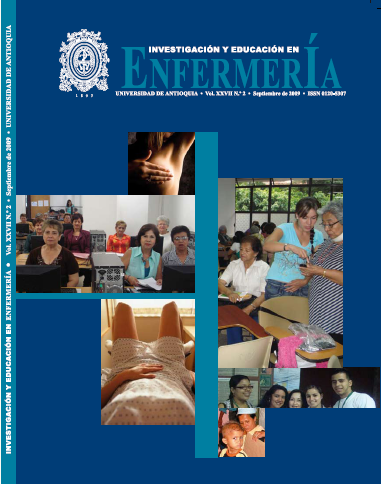THE WORLD OF THE NURSE: “HERE WE NEVER REST”. CARE CONTEXT
DOI:
https://doi.org/10.17533/udea.iee.2826Keywords:
Nursing pratice, nursing care, nursing assistance, care context.Abstract
Objective: to understand the context, goals and meanings that nurses give to their care roles.
Methodology: qualitative investigation whose methodological approach was focused ethnography in nursing care to surgical patients in high complexity health institutes in Medellín, Colombia. The study is performed between 2005 and 2007. The data collection is done by means of participant observations and in-depth interviews to nurses. We carry out a total of 11 nurses’ interviews and observations of shifts changes, nursing rounds, medical rounds and patients discharge. We use an informed consent form that each interviewee signed. In open coded analysis we meticulously examin and compare searching, differences and similarities.
Results: the findings make clear that nurses consider patient first of all as human beings and they believe that humanity is an essential component for those who you look after and is a value for those who provide care. Attention to every detail makes part of the nurse’s world in their care actions. They are responsible for everything in the service and it implies “having to have four eyes”.
Conclusion: the nurses’ world, in the studied services, is characterized as a complex context that demands to be permanently attentive to multiple and simultaneous situations. In their own words is defined as “Here we never rest”.
Downloads
References
(1) Castrillón MC. La dimensión social de la práctica de la enfermería. Medellín: Universidad de Antioquia; 1997. p. 36-62.
(2) Swanson KM. What is known about caring in nursing science. En: Hinshaw A, Fleetham S, Shaver J. Handbook of clinical nursing research. Thousand Oaks: Sage; 1999. p. 31-60.
(3) Castrillón MC, Orrego S, Pérez L, Ceballos ME, Arenas G. La enfermería en Colombia y la reforma del sector salud. Invest Educ Enferm. 1999;17(1):13-33.
(4) Torralba F. Antropología del cuidar. Barcelona: Instituto Borja de Bioética; 1998. p. 311.
(5) Duran M. Enfermería: desarrollo teórico e investigativo. Bogotá: Unibiblos; 1998. p. 77.
(6) Meleis A. Theorical nursing: development and progress. 3ª ed. Philadelphia: Lippincott; 2005. p. 279-381.
(7) Kerouac S, Pepin J, Ducharme F, Duquette A, Major F. El pensamiento enfermero. Barcelona: Masson; 1996. 167 p.
(8) Grupo de cuidado de la Universidad Nacional de Colombia. El arte y la ciencia del cuidado. Bogotá: Universidad Nacional de Colombia; 2002. 385 p.
(9) Fawcet J. Analysis and evaluation of contemporary nursing knowledge: models and theories. Philadelphia: Davis Company; 2000.
(10) Taylor J, Bogdan R. Introducción a los métodos cualitativos de investigación. Barcelona: Paidos; 1984. p. 29.
(11) Hammersley M, Atkinson P. Etnogtrafía: métodos de investigación. Barcelona: Paidos; 1994. p. 213.
(12) Boyle J. Estilos de etnografía. En: Morse J. Asuntos críticos en los métodos de investigación cualitativa. Medellín: Universidad de Antioquia; 2003. p. 185–217.
(13) Schwartz H, Jacobs J. Qualitative Sociology. New York: The Free Press; 1979.
(14) Valles S. Técnicas cualitativas de investigación social: reflexión metodológica y práctica profesional. Madrid: Síntesis; 1997. p. 159-161.
(15) Straus A, Corbin J. Bases de la investigación cualitativa: técnicas y procedimientos para desarrollar la teoría fundamentada. Medellín: Universidad de Antioquia; 2002. p. 111.
(16) Glaser B, Strauss A. The discovery of grounded theory: strategies for qualitative research. Chicago: Aldine; 1967.
(17) Ricoeur P. La metáfora viva. 2ª ed. Madrid: Trotta; 2001. p. 150-164.
(18) Daza de Caballero R, Torres AM, Prieto G. Análisis crítico del cuidado de enfermería. Index Enferm. 2005;14(48-49):22.
(19) Marqués S. Una vocación de servicio a la enfermería. Index Enferm. 2003;12(40-41):61.
(20) Escobar D. Perspectiva fenomenológica sobre el poder del cuidado humano amoroso. Caracas: Instivoc; 2004. p. 186.
(21) Geertz C. La interpretación de las culturas. 8a ed. Barcelona: Gedisa; 1997. p. 20
Downloads
Published
How to Cite
Issue
Section
License
Derechos de propiedad / Direitos de Propriedade
English: If the article is accepted for publication, all copyright will be of exclusive property of Investigación y Educación en Enfermería. The text and the graphics included in the publication are exclusive responsibility of the authors and not necessarily reflect the thought of the Editorial Committee.
Español: Si el artículo es aprobado para publicación, todos los derechos son de propiedad de Investigación y Educación en Enfermería. El texto y las gráficas incluidas en la publicación son de exclusiva responsabilidad de los autores y no necesariamente refleja el pensamiento del Comité Editorial.
Português: Se o artigo for aceito para publicação, todos os direitos autorais serão de propriedade exclusiva de Investigación y Educación en Enfermería. O texto e os gráficos incluídos na publicação são de responsabilidade exclusiva dos autores e não refletem necessariamente o pensamento do Comitê Editorial.















